It’s been 25 years since Lost Highway was released to the world, with the date of record being January 15, 1997 in France and February 21 in the United States. I saw it sometime however shortly thereafter, in a theater in suburban Ohio, along with some other teenage friends, all of us perhaps more inspired by the music on the soundtrack and apparent darkness of the film than anything like knowledge. It was my first experience of a David Lynch film, and basically nothing has been the same since.
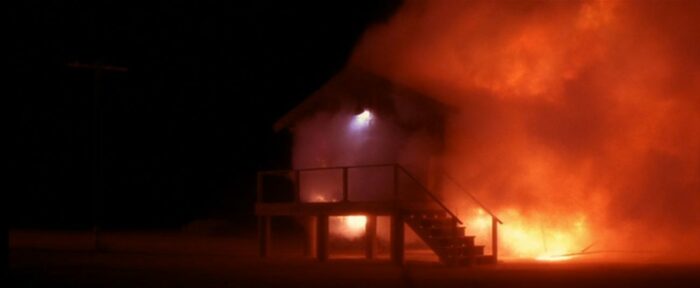
I’ve seen Lost Highway more times than I can count over the years—on the VHS tape I purchased as soon as I could, or the DVD I got my hands on later when I finally switched formats, and again in the theater at the Brooklyn Academy of Music some 10 to 15 years ago with a friend who was seeing it for the first time.
I decided not to watch it again before writing this. Much like Fred I guess I like to remember things in my own way. Plus, I’m not setting myself to an attempt to take up any kind of critical distance towards Lost Highway here, to assess its cultural impact or legacy, or to consider how it lands now as opposed to how it did in the late 1990s. Others can do all of that.
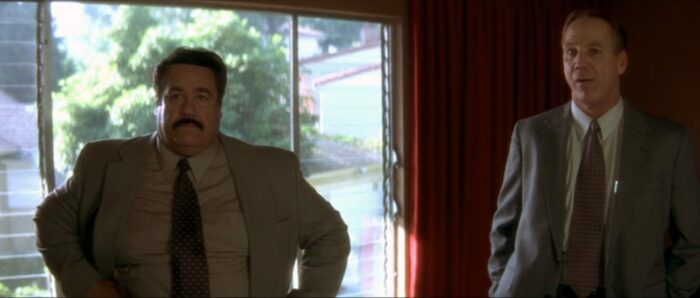
Lost Highway is a dream, and it’s Lynch’s dream of course, but also our dream. This film lodged itself in my mind that night in 1997. I couldn’t stop thinking about it for days, trying to puzzle it out, and when I got the videotape I watched it again and again, working on the problem.
Until I realized that this whole approach of trying to figure out the movie, as if to solve it, was the utterly wrong one, or, rather that if a solution was the goal it was nonetheless not one to be achieved. The joy lay in the thinking itself—thinking without end or resting place—and the way that Lost Highway spurred such activity in me. It’s about enjoying the problem itself.
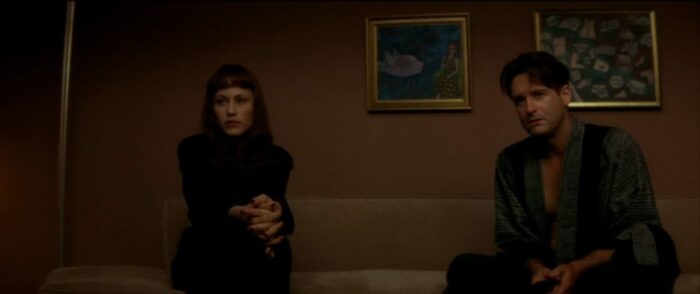
Thus, one must distinguish between explanation and interpretation, as one can certainly interpret Lost Highway but not explain it if that would mean resolving its problems once and for all. Any attempt to do so, any belief that one has done so, will involve ignoring those sticky points that don’t quite fit or devolve into triviality.
It’s all Fred’s dream! Fine, tell me what the dream means. Now we’re back to interpretation, which can be better or worse (and perhaps even wrong) but never definitive, as signifiers will always slip through its cracks, or only point to other signifiers without ever coming to rest on some determinate signification.
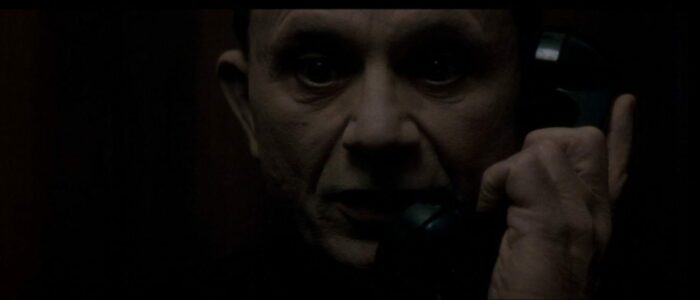
It’s no wonder that Lynch’s work inspires so many to bring psychoanalysis to bear upon it when the problem is so much like the one Freud took up in his Interpretation of Dreams. Time loops, two appear as one and one as two—it’s fundamentally a dream logic, with meaning carried more by affect than reason.
Slavoj Zizek’s essay on Lost Highway is well worth reading, but a psychoanalytic framework risks being as reductive as any other when it comes to an interpretation of content. Freud saw Oedipus everywhere, for example, and that was a mistake. We might see Oedipus in Lost Highway, but none of the pieces fit into that box neatly. Try to make them fit and you’ll lose something essential, just outside the frame.
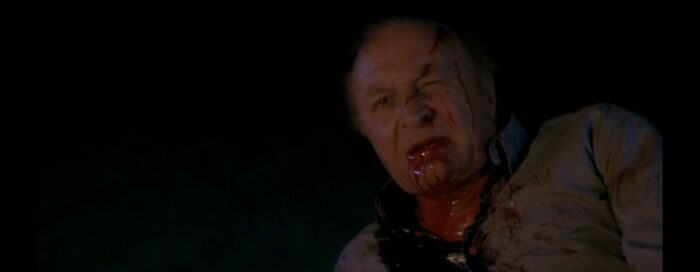
What does seem clear to me is that Lost Highway is about the structure of desire, and one can sketch an interpretation by articulating the elements of this structure. Patricia Arquette’s character(s) represents its object (the object of desire, or what Jacques Lacan would call objet petit a, if you’re into that kind of thing).
We don’t really want to have what we desire. To possess it becomes boring. There will be an unconscious drive to destroy it (call it the death drive, beyond the pleasure principle, if you like). Thus Fred kills his wife.
On the other hand, Pete (who of course is also Fred) pursues the object of his desire but he’ll never have her. Alice’s name is Renee and if she told you differently she’s lying.
The object of desire is a fantasy, but all you ever get is the reality. You can’t possess a phantasm. It’s a cycle, and it’s interminable, but that’s a good thing. The only way out is in death or disillusionment.

All over the place, that death is symbolic, lying in the minds of those who would prefer to not think or desire, who have already committed what Albert Camus called philosophical suicide, and the disillusionment is boring, manifesting as stale cynicism.
What we’re after—what Lynch is always after—is the interesting, the idea that grabs you, that object of desire you can never have because to have it would be to veritably explode in enjoyment…not death but perhaps le petite mort will follow.

We’re after the dream that will suck us into its orbit and refuse to let go, and Lynch gives it to us on film, to be dreamt over and over again, worked over in thought over and over again, perpetually—to embrace its inherent kernel of nonsense and make sense of things by circulating around it, never coming to rest but rather continuing to careen down that highway in the dark, unable to see past the few feet illuminated in front of us by the lights that jut out ahead, unsure of who we are or where we are going in this ocean of chaos, but just enjoying the ride.
I have merely sketched an interpretation for you here. I haven’t gone into how This Mortal Coil’s “Song to the Siren,” which features so prominently in the film’s climax, repeats as a motif in the previous sex scene between Fred and Renee as a faint echo of itself, or articulated how it works that the second time comes first. I haven’t even mentioned Mr. Eddy or the Mystery Man, much less explored their significance as figures of the superego, nor have I cashed out psychoanalytic terminology so much as thrown it at you, hoping to spur thought and inquiry more than to offer it a place to land.
It wouldn’t be an exaggeration to say seeing Lost Highway that night in Ohio 25 years ago changed the way I watch film. Its aftereffects on me have made the world richer. To properly enjoy it, you have to let it make reality strange, and accept that rather than answering your questions, it’s prone to mock the fact that you want to know why, which of course might be jarring.
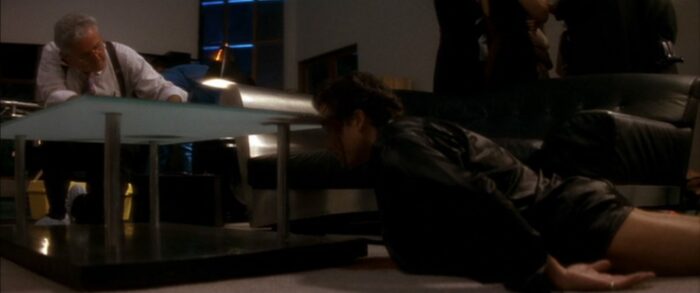
I can’t assess Lost Highway with some kind of critical distance because I haven’t stopped thinking about it for 25 years, pursuing that object of desire which always—by definition—eludes me, like a tantalizing secret that always seems to lie just ahead in the darkness, a little bit further down the road.
But it’s the trip that’s the fun part.







Zizek’s essay on this is a must read.
Thanks for the excuse to revisit this film. Saw it in the theater opening night, and twice more the following week. After that first viewing I ran into a barfly at my neighborhood hang. His name was Al Strobel and he played the One Armed Man in Twin Peaks. Reeling from Lost Highway, still the most raw experience i ever had in a theater, I had the greatest conversation I’ve ever had about Lynch’s work, and was granted useful insights. Lynch provides us with an experience, and of course you’re so right, that to “solve” the mysteries of these films is never the point.
“Lost Highway,” “Mulholland Drive,” and “Inland Empire” are three David Lynch films that have something in common …. that is, shifting identities.
I like to dream when I’m sleeping at night. And dream logic is what David Lynch specializes in. You can TRY to figure it out, and sometimes you can in a very symbolic way, but sometimes you just have to immerse yourself in the dream and accept it on its own terms.
Love it! Thank you for this! I think there was an interview with Lynch somewhere where he said that the OJ Simpson case helped to inspire Lost Highway. That someone can create a dissociative realty in their head to cope with and hide aspects of the truth even from themselves, helped me understand things about the film a little more.
Yes, I’m starting to remember that too…
Thanks for reading!